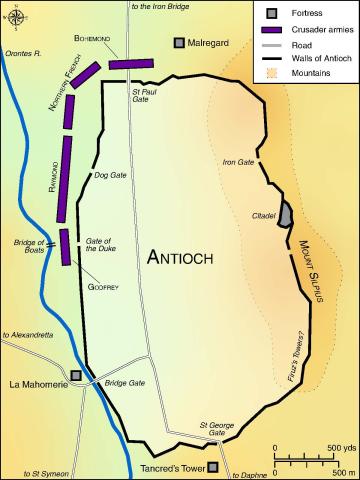Kerbogah Tries to Retake Antioch
[9.26.4] Nocte quippe superveniente, ignis dē caelō appāruit ab occidente veniēns, et appropinquāns cecidit intrā Turcōrum exercitūs. Undē mīrātī sunt et nostrī et Turcī. Māne autem factō, tremefactī Turcī fūgērunt omnēs pariter, prō ignis timōre, ante dominī Boamundī portam, illīcque hospitātī sunt. Pars vērō, quae erat in castellō, agēbat bellum cum nostrīs diē noctūque, sagittandō, vulnerandō, occīdendō.
Alia autem pars undique obsēdit cīvitātem, ita ut nūllus nostrōrum cīvitātem audēret exīre aut intrāre, nisi nocte et occultē. Ita vērō erāmus obsessī et oppressī ab illīs, quōrum numerus fuit innumerābilis. Istī autem prophānī et inimīcī Deī ita tenēbant nōs inclūsōs in urbe Antiochīae, ut multī mortuī fuerint famē, quoniam parvus pānis vēndēbātur ūnō bizanteō. Dē vīnō nōn loquar. Equīnās namque carnēs aut asinīnās mandūcābant, et vēndēbant. Vēndēbant quoque gallīnam quīndecim solidīs, ōvum duōbus solidīs, ūnam nucem ūnō dēnāriō; omnia enim valdē erant cāra. Folia fīcī et vītis et carduī omniumque arborum coquēbant et mandūcābant, tantam famem immēnsam habēbant. Aliī coria caballōrum et camēlōrum et asinōrum atque boum seu būfalōrum sicca dēcoquēbant, et mandūcābant. Istās et multās ānxietātēs ac angustiās, quās nōmināre nequeō, passī sumus prō Chrīstī nōmine et Sānctī Sepulchrī viā dēlīberandā. Tālēs quoque trībulātiōnēs et famēs ac timōrēs passī sumus per vīgintī sex diēs.
notes
(June 1098) A fire appears in the night sky and supposedly lands on the main Turkish army; this causes them to flee, and they encamp outside Bohemond's gate. The Turks in the citadel attack, and the main Turkish army surrounds the city causing starvation and exorbitant prices for food.
Nocte quippe superveniente: June 13–14, 1098.
ignis dē caelō appāruit ab occidente veniēns: either a shooting star or, more dramatically, a "low latitude aurora," which can occur in temperate zones and is typically red.
intrā ... exercitūs: either plural for singular, or our author thinks of Kerbogah's army as composed of a number of armies.
prō ignis timōre: “because of fear of fire”; this ML use of prō + abl. is common in our text.
ante dominī Boamundī portam: perhaps (?) the gate that allowed them to break into Firuz's tower (8.20.7); or one near the citadel, where Bohemond planted his standard (8.20.9), though no gate is mentioned.
hospitātī sunt: “they made camp.”
in urbe Antiochīae: genitive of equivalence, rare in CL.
parvus pānis vēndēbātur ūnō bizanteō: a "bezant" (bizantius aureus) is said to been roughly equal in value to a soldius / shilling, i.e. 12 pennies (see next note). I don't know why our author switches fro bezants to shilllings and pence.
Vēndēbant quoque gallīnam quīndecim solidīs, ōvum duōbus solidīs: a hen cost fifteen shillings and an egg cost two shillings; there were twelve pennies (denarii) in a shilling; a penny was about as much as a laborer would earn in a day.
prō Chrīstī nōmine et Sānctī Sepulchrī viā dēlīberandā: “for the name of Christ and (for) liberating the way of the Holy Sepulchre.”
per vīgintī sex diēs: from June 3 to June 28, 1098.
vocabulary
profānus –a –um: wicked, heathen
famēs famis, f.: hunger, starvation
bizanteus –ī, m.: bezant (the standard Byzantine gold coin)
gallīna –ae, f.: hen
solidus –ī, m.: solidus (the standard late Roman gold coin); a shilling (= 12 pence)
nux nucis, f: nut
folium –(i)ī, n: leaf
fīcus –ī, f.: fig (note the gender)
carduus –ī, m: thistle
corium –(i)ī, n: thick skin, hide (CL); leather (ML)
dēlīberō (1): to deliberate (CL); to free completely, liberate (ML)

